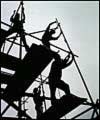| Basic form, past tense and past participle |
 |
||||||
|
Carmen
from Hong Kong asks: Are there any rules for us to follow, whether we need to add -ed or can it just remain unchanged when we want to change a verb to the past tense?
|
| Roger replies: | ||
There
aren't many verbs where the basic form, past tense and past participle
forms are all the same. I can think of one or two verbs that end with
-t that do not change. Cut and let would be two
examples. Consider the following:
|
||||
|
For
the rest, verbs are either regular and formed in the past
tense and past participle with an ?b>-ed?ending, or they are
irregular, like ?b>build?in your example, Carmen, which
becomes ?b>built?in both past tense and past participle forms.
Many irregular verbs have different forms for past tense and past
participle. Consider the following:
|
|||||||||||||||||||||||
|
Here
are eight more common irregular verbs. Test your knowledge to see
if you can get them all right.
eat/fall:
grow/hang:
lie/leave:
|
||||||
|
Regular verbs
The past tense -ed ending is sometimes pronounced /t/, sometimes /d/ and sometimes /id/. Which we use depends on which letters the verb ends with in the basic form. If the basic form ends with /d/ for instance, as in fold, it is pronounced /id/ in the past tense and past participle form. Say
it to yourself and listen to how you say folded. If it ends
with /p/ in the basic form, as in clap, then it is
pronounced /t/ in past endings. Say it to yourself and listen
to how you say clapped. |
||||
After /p/, /k/, /f/, /s/, /sh/, /th/ and /ch/ -ed is always pronounced /t/ and after all other sounds, including vowels, it is always pronounced /d/. |
||||||||||||||||||||||||||||||||||||||||||||||||||||||||||||||||||||||||||||||||||||||||||||